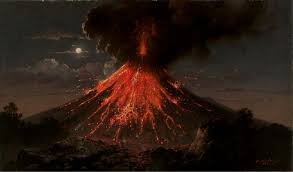FEATURE-Hawaii residents return to new normal after epic volcano eruption

- Country:
- United States
For weeks on end last year, Darryl Clinton watched the Kilauea Volcano from a front-row seat on the deck of his friend's house in Kapoho on Hawaii's Big Island, only leaving after a "lava bomb" from an erupting ground fissure flew onto the porch and nearly sliced his foot off.
On Monday he drove back to live at the house where he was injured after the County of Hawaii announced it had opened a makeshift road into the area, nearly a year after the historic eruption of the Kilauea Volcano forced hundreds to evacuate and destroyed more than 700 structures. Clinton and his neighbors now occupy what Hawaiians call a "kipuka," an area of land surrounded by a now-hardened lava flow.
He and other newly returned residents say they moved back because they can live inexpensively in a benign climate with beautiful surroundings - even if it's under one of North America's most active volcanoes. "I don't really want to be in the whole rat race thing, and I can escape that here," said Clinton, 58, who moved to Kapoho in 2006 with his family and built an off-the-grid house - not hooked up to utilities - and started a garden.
Kilauea has now returned to "normal," the U.S. Geological Survey (USGS) announced on March 26. "What actually happened is that, based on Kilauea Volcano's behavior over the past 8 months and its lack of eruptive activity, the USGS Hawaiian Volcano Observatory lowered the Volcano Alert Level for Kilauea to NORMAL," USGS spokeswoman Janet Babb said in an email.
NEW NORMAL
It's a new normal for returning residents. Not all of them are looking forward to it. Pauline and Eddie McLaren were cleaning their house of soot left by brush fires. The couple also lived off the grid, getting by on a small pension and pasturing horses on their three-acre (1.21-hectare) lot. Life wasn't easy and they had planned to sell their home before last year's eruption. They think the property is almost worthless now. "The bottom line is, we came back because we had nowhere else to go," Pauline, 78, said. "Now I don't think we'll ever leave."
The couple received $4,000 in rental assistance from the Federal Emergency Management Agency and $9,000 from the Small Business Administration to repair the pasture fences burned in the brush fires, she said. Pauline is not afraid of another eruption because she doesn't expect to be alive for the next one. "Next stop: six feet," she quipped, pointing at the ground below her feet.
PSYCHOLOGICAL CHALLENGE
Carrie Fischer, 59, says she and her husband Harald are happy to stay in their largely unscathed home in the new kipuka and she isn't worried about another eruption. "It's funny, I'm not that worried about it happening again because we lived through it. There was so much warning before it happened," Fischer said. She says the main challenge is psychological; she tries not to think about the ridges of cooling lava that now surround her neighborhood. "I try not to think that I can't get out easily."
During the eruption, fountains of lava from some 22 ground fissures created molten ridges of up to 20 feet (6 meters) high, and in places cinder cones up to 50 feet (15 meters) high. When it rains the still-cooling lava ridges give off steam plumes. Ingrid Webb, 34, says she and her husband and four children are also delighted to be able to drive back to their 15-acre (6-hectare) organic farm.
She doesn't know of anywhere else where she can re-create the life they have in the East Rift Zone, where the climate and soil are so conducive to the crops they grow. The main headache she says is access into the community on the makeshift road, which only residents can use for now - not repairmen, or farmworkers. But it's all worth it, she adds "This is our future. This is our kids' future. The farm is my kids' college fund."
(With inputs from agencies.)
ALSO READ
"Here to support my friend Annamalai": TDP's Nara Lokesh joins BJP's Tamil Nadu chief at roadshow
Shell, Friends of the Earth each say European climate ruling backs their view in Dutch case
China top legislator Zhao says Beijing, Pyongyang set on developing friendly relations, KCNA says
"Samajwadi Party friendship with Azam Khan, Atiq, Mukhtar led...," UP Deputy CM Keshav Prasad Maurya
Friends are foes and foes have turned friends in Maharashtra's electoral battle










